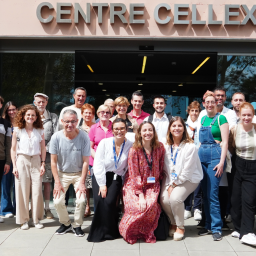
- Published in The Lancet Oncology results of the multicenter phase II MOUNTAINEER study (1) show that tucatinib plus trastuzumab had clinically meaningful anti-tumor activity and favorable tolerability in patients with chemotherapy-refractory, HER2-positive (HER2+) metastatic colorectal cancer.
- Led by John H. Strickler, Associate Professor of Medicine at Duke University Medical Center (Durham, USA), and co-authored by VHIO’s Elena Élez, this open-label clinical trial rings in the first U.S. Food and Drug Administration-approved anti-HER2 therapy for these patients.
- Data reported by the MOUNTAINEER investigators also provide the rationale to bring this treatment strategy into earlier lines of therapy. The phase III MOUNTAINEER-03 study is now underway to compare the efficacy and safety of combined HER-2 targeting compared to standard of care chemotherapy in treatment-naïve patients with HER2+ metastatic colorectal cancer.
An estimated 1.9 million new colorectal cancer (CRC) cases and 935.000 deaths occurred in 2020 worldwide, representing about one in ten cancer cases and deaths. Overall, CRC is the third most common malignancy and ranks second in terms of mortality (2). The global number of new cases is predicted to reach 3.2 million in 2040, with a rising incidence of CRC at younger ages (before age 50 years) (3).
“In patients with chemotherapy-refractory metastatic colorectal cancer, alternative treatment options generally show limited efficacy,” says Elena Élez, Principal Investigator of the Vall d’Hebron Institute of Oncology’s (VHIO) Colorectal Cancer Group, Medical Oncologist at the Vall d’Hebron University’s (HUVH) Medical Oncology Department, and a co-author of this present study (1).
“The development of more effective, target-directed therapies with a favorable safety profile represents an unmet clinical need in this patient population,” adds Élez.
Amplification or overexpression of the HER2 protein occurs in between 3 to 5% of all patients with metastatic colorectal cancer (mCRC). In patients with RAS and BRAF wild-type disease this rate is higher, upwards of 10%. Patients with HER2-positive (HER2+) mCRC and disease progression on early lines of chemotherapy receive limited clinical benefit from current standard of care treatments.
The multicenter phase II open-label MOUNTAINEER study evaluated the efficacy and safety of tucatinib—a tyrosine kinase inhibitor that induces HER2-driven cancer cell death—in combination with trastuzumab, a monoclonal antibody that binds to the HER2 protein and prevents the division and growth of cancer cells, in patients with HER2+ RAS wild-type chemotherapy–refractory mCRC.
MOUNTAINEER, the largest prospective trial to date for patients with HER2+ mCRC, enrolled 117 patients. The objective response rate was 38.1% with a median duration of 12.4 months. Median progression free survival was 8.2 months in patients treated with the experimental combination and overall survival was 24.1 months. The combination of tucatinib plus trastuzumab was well tolerated and the quality of life of these patients was preserved.
“The superior efficacy of this combined strategy versus HER2 targeting with these and other agents as monotherapy is probably due to complementary activity of blocking the HER2 signaling pathway in tumor cells,” suggests Elena Élez.
The promising anti-tumor activity and favorable tolerability of tucatinib plus trastuzumab led to the first U.S. Food and Drug Administration-approved anti-HER2 regimen for metastatic colorectal cancer this year and is an important new addition to the treatment armamentarium of chemotherapy-refractory, HER2-positive RAS wild-type metastatic colorectal cancer. It is expected that this combination will also be approved for this patient population upon evaluation by the different regulatory authorities and healthcare reimbursement systems.
“Our data also provide the rationale to bring this treatment strategy into earlier lines of therapy. The global phase III MOUNTAINEER-03 randomized trial is now underway to evaluate tucatinib with trastuzumab plus FOLFOX6 standard of care in treatment-naïve patients with HER2-positive metastatic colorectal cancer,” concludes Élez.
###
References:
- Strickler JH, Cercek A, Siena S, André T, Ng K, Van Cutsem E, Wu C, Paulson AS, Hubbard JM, Coveler AL, Fountzilas C, Kardosh A, Kasi PM, Lenz HJ, Ciombor KK, Elez E, Bajor DL, Cremolini C, Sanchez F, Stecher M, Feng W, Bekaii-Saab TS; MOUNTAINEER investigators. Tucatinib plus trastuzumab for chemotherapy-refractory, HER2-positive, RAS wild-type unresectable or metastatic colorectal cancer (MOUNTAINEER): a multicentre, open-label, phase 2 study. Lancet Oncol. 2023 May;24(5):496-508.
- Sung H, Ferlay J, Siegel RL, Laversanne M, Soerjomataram I, Jemal A, Bray F. Global Cancer Statistics 2020: GLOBOCAN Estimates of Incidence and Mortality Worldwide for 36 Cancers in 185 Countries. CA Cancer J Clin. 2021 May;71(3):209-249.
- Keum N, Giovannucci E. Global burden of colorectal cancer: emerging trends, risk factors and prevention strategies. Nat Rev Gastroenterol Hepatol. 2019 Dec;16(12):713-732.
























